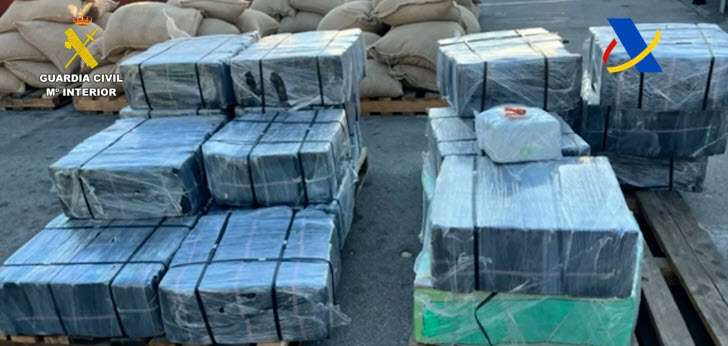Even in a region known for record-setting violence, Ecuador’s recent spiral of lawlessness and bloodshed stands out.
Deadly crime in the Andean nation is now at an all-time high.
The national murder rate exceeds that of Brazil and Mexico, which have long been among the most murderous countries in Latin America.

No wonder President Guillermo Lasso’s approval ratings have plummeted, and calls have been made for his impeachment – sparked by corruption allegations linking the president’s brother-in-law to drug traffickers.
Lasso and his brother-in-law have denied the allegations.
At the heart of Ecuador’s problems is the insatiable global demand for cocaine.
Thanks in part to Balkan gangs, Ecuador now serves as a transshipment point and export center for cocaine from Colombia and Peru.
The crisis is acute in Esmeraldas, on the Colombian border, and especially in the port city of Guayaquil, the country’s gateway to the world.
Ecuador’s richest city hosts five of the country’s eight shipping terminals and is also one of the 25 most dangerous cities in the world.
Last year, Guayaquil recorded 47.7 homicides per 100,000 inhabitants, a seven-fold increase in five years.
The chaos continues even though a state of emergency has been declared seven times since mid-2021.
Last week, President Lasso authorized civilian gun use “for personal defense,” a move that smacks more of desperation than command and control.
Once lauded for its strategy to curb deadly drug gangs, Ecuador now seems firmly in their grip.
The rise in violence is closely linked to a sharp increase in deadly confrontations between organized groups vying for dominance in Ecuador’s burgeoning cocaine trade, which has repercussions far beyond the country of 18 million people.
Emerging criminal networks with global reach and ambition drive the deadly drug trade.
Only a renewed commitment by local, national, and regional authorities to promote interagency cooperation, cross-border collaboration, data-driven strategies, and intelligence can prevent Ecuador’s security crisis from becoming a regional emergency.
EUROPEAN CONNECTION
Albanian organized crime began migrating to Ecuador in the 1990s, lured by the prospect of joining flourishing local cartels and by relatively lax border controls.
Until recently, Albanians could enter Ecuador freely and without visas.
This laissez-faire turnstile policy ended when Ecuador introduced stricter visa requirements in 2020.
Some 33% of cocaine seized in Ecuador was destined for the European market in 2021, compared to just 9% in 2019.
The Balkans, in particular, is a major new hub in this lucrative intercontinental trade (worth US$10 billion in 2017), with Albanian gangs playing an increasingly important role on both sides of the equator.
After record arrests in 2021, Ecuador currently ranks third in cocaine seizures (6.5% of global seizures), surpassed only by Colombia (41%), where the coca crop is booming, and the United States (11%), despite pandemic interdictions.
Of the 210 tonnes of cocaine seized by Ecuador in 2021, Guayaquil accounted for about 96.
Most cocaine is hidden in shipping containers, of which only about 8% to 10% is controlled.
As counternarcotics efforts pressure Brazil, Colombia, and Peru, Ecuador has become a preferred destination for foreign smugglers.
Dollarization and corruption facilitate the purchase of counterfeit documents such as identity cards, passports, and export permits.
Most known Albanian criminals reside in Guayaquil, often under false identities.
The Balkan media did not spare details about how Albanian, Colombian, Mexican, and even Russian cartels fight for Guayaquil’s control.
At least six Albanians have been executed in gang-related ways in the last decade.
According to some Ecuadorian intelligence sources, the Albanians recruit dominant local gangs as “preferred partners,” while other sources say the Albanians ultimately want to control the entire supply chain.
The Albanian mafia resorts to various tricks to move drugs, from using front companies to hide cocaine in shipments of bananas, tea, and shrimp to cloning customs seals to disguise breached containers.
Little of this would be possible without a wink and a nod from officials in power.
Ecuadorian intelligence has long targeted the Albanian mafia. In 2014’s “Operation Balkans,” they found that two alpha crime syndicates – the Azemi and Rexhepi gangs – were infiltrating port operations to obtain packing lists and select containers for Europe.
Albanians arrested in the operation were also identified as financiers and administrators of the scheme.
Operation Balkans ended with the arrest of Remzi Azemi, the ring’s leader, and 11 other gang members, including Albanian and Ecuadorian nationals.
Ecuadorian police and prosecutors accused the organization of storing cocaine in Guayaquil for transport to Europe.
Azemi escaped custody a month later, resurfaced in Europe in 2017, and was later arrested in Germany.
Azemi is still being prosecuted in Ecuador, including for the murder of his Ecuadorian wife and Albanian-Montenegrin refugee Fadil Kacanic.
Ecuadorian authorities have not yet disclosed their findings in this case or even acknowledged the presence of foreigners with ties to the brutal Balkan mafia.
Two different intelligence sources go so far as to speak of “high-level” collusion between Ecuadorian police and the Albanian mafia, one of whose gang members reportedly died at the hands of police.
While these reports remain unconfirmed, they leave little doubt that law, order, and public safety are at stake in Ecuador and beyond.

